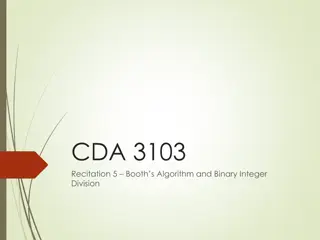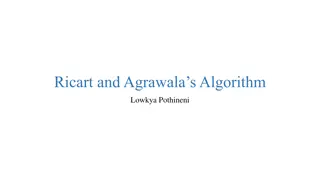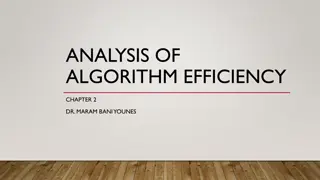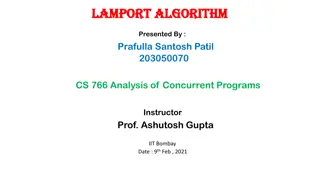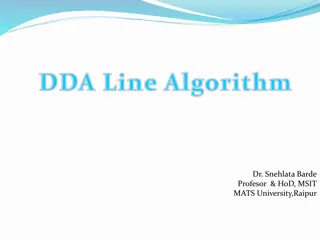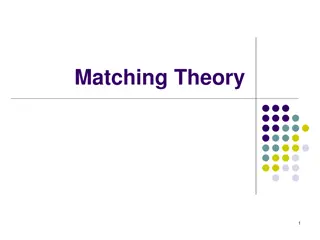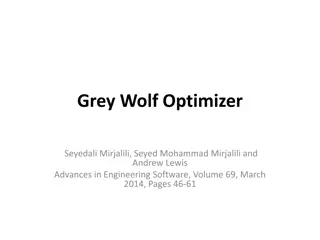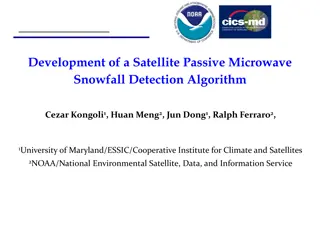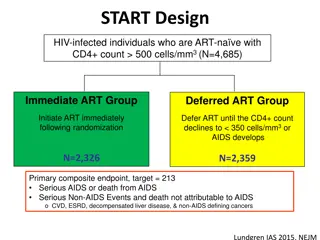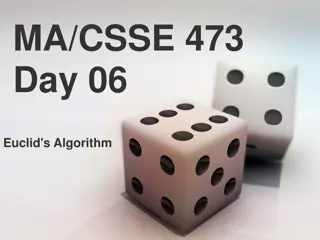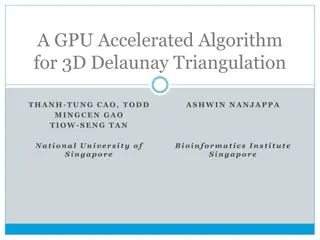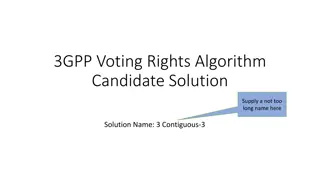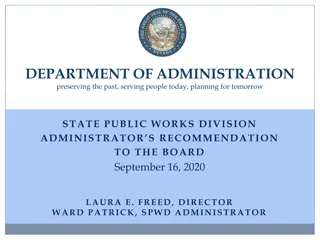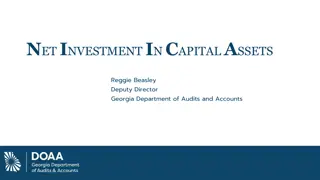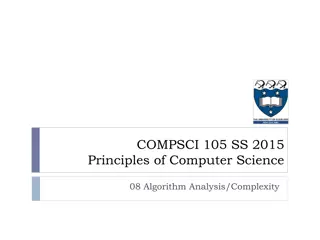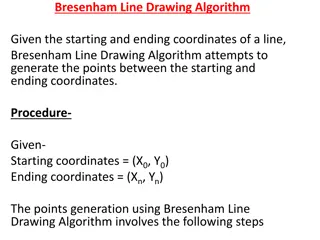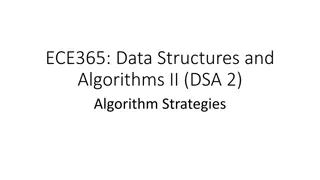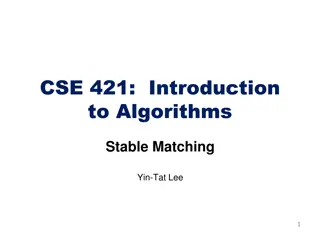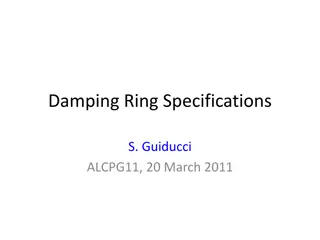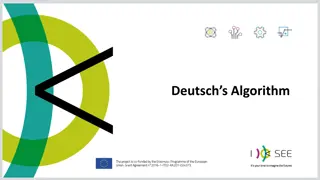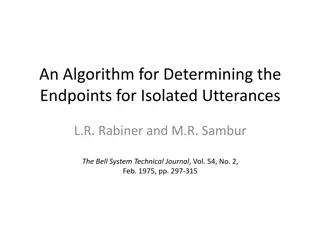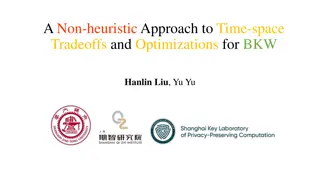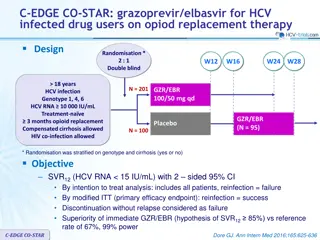Algorithm Analysis
Algorithm analysis involves evaluating the efficiency of algorithms through measures such as time and memory complexity. This analysis helps in comparing different algorithms, understanding how time scales with input size, and predicting performance as input size approaches infinity. Scaling analysi
1 views • 30 slides
Understanding Acceptance of Construction Works
The process of acceptance of construction works involves rescission of contracts, different types of acceptance such as partial, final, and definitive, and the obligations of investors and contractors. It also includes details on partial acceptance according to Art. 654 CC and FIDIC regulations for
4 views • 33 slides
Understanding Autism Acceptance vs. Awareness & Why It Matters
Trainings led by Emily Whaland, LPC, highlight the shift from awareness to acceptance in understanding autism. The sessions focus on fostering diversity, enhancing transition planning, and empowering autistic voices. Rejecting stigma and stereotypes, the agenda encourages active involvement and supp
2 views • 23 slides
Understanding Acceptance and Commitment Therapy (ACT)
Acceptance and Commitment Therapy (ACT) is a therapeutic approach that focuses on psychological flexibility, emphasizing acceptance of thoughts and feelings, commitment to values, and behavioral changes. It aims to help individuals develop skills to navigate life's challenges effectively, promoting
4 views • 20 slides
Understanding Booth's Algorithm for Binary Integer Division
Learn about Booth's Algorithm and how it facilitates binary integer division. Discover key points to remember when using the algorithm, steps to initiate the process, and a detailed example to illustrate the multiplication of two operands using Booth's Algorithm.
1 views • 42 slides
Understanding Self-Acceptance Through the Big I, Little i Exercise
Explore the concept of self-acceptance through the Big I, Little i exercise. Discover how the Big I represents your totality, while the little i symbolizes various aspects of yourself. Reflect on your positive, negative, and neutral traits with guidance on filling in the Big I to gain a deeper under
0 views • 5 slides
Understanding Stable Matchings and the Gale-Shapley Algorithm
The concept of stable matchings is explored, along with the Gale-Shapley algorithm for finding them efficiently. Key ideas and steps of the algorithm are explained, supported by visuals. The process, examples, and observations related to the algorithm's effectiveness are discussed, highlighting the
1 views • 29 slides
Ricart and Agrawala's Algorithm for Mutual Exclusion
The Ricart-Agrawala Algorithm is a distributed system algorithm for achieving mutual exclusion without the need for release messages, developed by Glenn Ricart and Ashok Agrawala. The algorithm involves processes sending timestamped requests to enter a critical section, with careful handling of repl
1 views • 16 slides
Understanding Algorithm Efficiency Analysis
In this chapter, Dr. Maram Bani Younes delves into the analysis of algorithm efficiency, focusing on aspects such as order of growth, best case scenarios, and empirical analysis of time efficiency. The dimensions of generality, simplicity, time efficiency, and space efficiency are explored, with a d
1 views • 28 slides
Understanding Lamport Algorithm for Mutual Exclusion
Lamport Algorithm, presented by Prafulla Santosh Patil, is a permission-based algorithm utilizing timestamps to order critical section requests and resolve conflicts. It employs three types of messages: REQUEST, REPLY, and RELEASE, where each site manages a queue to store requests. By ensuring commu
0 views • 15 slides
Digital Differential Analyzer (DDA) Algorithm in Computer Graphics
In computer graphics, the Digital Differential Analyzer (DDA) Algorithm is utilized as the basic line drawing algorithm. This method involves interpolation of variables between two endpoints to rasterize lines, triangles, and polygons efficiently. The algorithm requires inputting coordinates of two
0 views • 9 slides
Public Opinion and Stakeholder Expectations in EU Project HYACINTH
The EU project HYACINTH focused on public and stakeholder acceptance of hydrogen technologies in the transition phase. Led by Prof. Paul Upham from Leuphana University, the project involved surveying participants across European countries to gauge awareness, acceptance, and support for Fuel Cell and
0 views • 20 slides
Understanding Deferred Taxation in Accounting
Deferred taxation in accounting arises due to differences in financial statement preparation and tax regulations, leading to provisions for future tax obligations. It involves estimating tax liabilities based on future tax legislation and accounting treatments. Provisions, such as for doubtful debts
0 views • 24 slides
Year-End Closing Checklist for School Fiscal Services
Review key areas such as tax revenue, grants, grant revenue, lease rental fund revenue, accruals, deferred outflow, liabilities, and deferred inflow to properly prepare for the year-end closing in school fiscal services. Ensure accuracy in financial records and compliance with regulations for a smoo
0 views • 21 slides
Understanding Matching Theory in Two-Sided Markets
Matching theory explores the dynamics of two-sided markets where participants on both sides seek suitable matches without using money. Examples include marriage markets, medical residencies, school choice programs, and more. We delve into the marriage model, stable matching criteria, and the deferre
0 views • 28 slides
Grey Wolf Optimizer: A Nature-Inspired Optimization Algorithm
The Grey Wolf Optimizer algorithm is based on the social hierarchy of grey wolves in the wild. Inspired by the pack behavior of grey wolves, this algorithm utilizes alpha, beta, and delta solutions to guide the optimization process. The hunting phases of tracking, pursuing, and attacking prey mimic
3 views • 16 slides
Emergency Paediatric Tracheostomy Management Algorithm
Emergency Paediatric Tracheostomy Management Algorithm provides a structured approach for managing pediatric patients requiring tracheostomy in emergency situations. The algorithm outlines steps for assessing airway patency, performing suction, and changing the tracheostomy tube if necessary. It emp
0 views • 4 slides
Development of Satellite Passive Microwave Snowfall Detection Algorithm
This study focuses on the development of a satellite passive microwave snowfall detection algorithm, highlighting the challenges in accurately determining snowfall using satellite instruments. The algorithm uses data from AMSU/MHS, ATMS, and SSMIS sensors to generate snowfall rate estimates, overcom
0 views • 20 slides
Clinical Trial Comparison of Immediate vs Deferred Antiretroviral Therapy in HIV-Infected Individuals
This study compared immediate initiation of antiretroviral therapy (ART) with deferred treatment in HIV-infected individuals with CD4+ count >500 cells/mm3. Results showed a significant reduction in primary composite endpoint events in the immediate ART group compared to the deferred ART group. Seri
0 views • 4 slides
Understanding Euclid's Algorithm: An Ancient Approach to Finding Greatest Common Divisors
Euclid's Algorithm, dating back 2500 years, offers a simpler method to find the greatest common divisor (gcd) of two non-negative integers compared to traditional factorization. By iteratively applying a rule based on the gcd of remainders, it efficiently computes gcd values. The basis of the algori
0 views • 15 slides
GPU Accelerated Algorithm for 3D Delaunay Triangulation
Thanh-Tung Cao, Todd Mingcen Gao, Tiow-Seng Tan, and Ashwin Nanjappa from the National University of Singapore's Bioinformatics Institute present a GPU-accelerated algorithm for 3D Delaunay triangulation. Their work explores the background, related works, algorithm implementation, and results of thi
0 views • 24 slides
Cuckoo Search: A Nature-Inspired Optimization Algorithm
Cuckoo Search (CS) algorithm, developed in 2009, mimics the brood parasitism of cuckoo species and utilizes Lévy flights for efficient optimization. This algorithm has shown promise in outperforming other traditional methods like PSO and genetic algorithms. The behavior of cuckoos in laying eggs an
0 views • 25 slides
Ford-Fulkerson Algorithm for Maximum Flow in Networks
The Ford-Fulkerson algorithm is used to find the maximum flow in a network by iteratively pushing flow along paths and updating residual capacities until no more augmenting paths are found. This algorithm is crucial for solving flow network problems, such as finding min-cuts and max-flow. By modelin
0 views • 26 slides
3GPP Voting Rights Algorithm: Contiguous-3 Solution Evaluation
This evaluation delves into the advantages and disadvantages of the 3 Contiguous-3 solution within the 3GPP voting rights algorithm. It explores scenarios to test the algorithm's effectiveness in granting and revoking voting rights based on meeting attendance types. The evaluation includes diverse h
0 views • 10 slides
State Public Works Division Administrator's Recommendations for Deferred Maintenance Projects
State Public Works Division presents a strategic plan encompassing vision, mission, and prioritization criteria for deferred maintenance projects. The administrator recommends addressing legal requirements, such as ADA compliance and life safety issues, while focusing on essential government facilit
0 views • 17 slides
Understanding Net Investment in Capital Assets and Its Importance
Net Investment in Capital Assets is a critical component of an entity's financial position, reflecting the value of capital assets owned. It represents the portion of the net position that is not spendable as it is invested in assets. Calculating Net Investment in Capital Assets involves subtracting
1 views • 17 slides
Introduction to Algorithm Analysis and Complexity in Computer Science
Algorithm analysis is crucial in determining the efficiency of programs by analyzing resource usage such as time and space. This involves comparing programs, understanding data structures, and evaluating algorithm performance. Efficiency is key as program execution time depends on various factors be
0 views • 66 slides
Update on Deferred Maintenance Projects, Budget Targets, and Preconstruction Progress - February 9, 2022
Progress updates on deferred maintenance work, budget targets, and preconstruction/design activities as of February 9, 2022. Includes details on work completed, ongoing projects, projected costs, and design advancements across various project areas.
0 views • 9 slides
Bresenham Line Drawing Algorithm Explained with Examples
Bresenham Line Drawing Algorithm is a method used to generate points between starting and ending coordinates to draw lines efficiently. This algorithm involves calculating parameters, decision parameters, and iteratively finding points along the line. Two example problems are provided with step-by-s
0 views • 8 slides
Algorithm Strategies: Greedy Algorithms and the Coin-changing Problem
This topic delves into general algorithm strategies, focusing on the concept of greedy algorithms where locally optimal choices are made with the hope of finding a globally optimal solution. The discussion includes the nature of greedy algorithms, examples such as Dijkstra's algorithm and Prim's alg
0 views • 91 slides
Stable Matching Problem and Gale-Shapley Algorithm Overview
The content provides information on the stable matching problem and the Gale-Shapley algorithm. It covers the definition of stable matching, the workings of the Gale-Shapley algorithm, tips for algorithm implementation, and common questions related to the topic. The content also includes a summary o
0 views • 16 slides
The Path to Self-Acceptance and Understanding Through Artwork and Reflection
Explore the importance of self-acceptance in discovering one's true identity and the impact of emotions on our well-being. Reflect on images, artist statements, and articles to analyze universal themes and the role of adversity in self-acceptance. Engage in self-exploration through writing and discu
0 views • 24 slides
Understanding Self-Acceptance and Overcoming Stigma
Self-esteem and self-acceptance are distinct concepts, with self-acceptance focusing on embracing all facets of oneself unconditionally. Developing self-acceptance involves stages like aversion, curiosity, tolerance, and allowing. Overcoming avoidance and resistance can lead to self-compassion and g
0 views • 10 slides
ILC Damping Ring Specifications and Recommendations
Specifications and recommendations for the ILC Damping Rings include nominal parameters for injected and extracted beams, positron acceptance criteria, longitudinal acceptance guidelines, energy acceptance with quantum lifetime considerations, and layout components for injection/extraction systems.
0 views • 13 slides
Understanding Care Act 2014: Charges, Deferred Payments, and Enforcement
Explore the key provisions of the Care Act 2014 regarding charges, entitlements, deferred payment agreements, adequate security, registration of charges, and enforcement procedures in cases where no deferred payment agreement is in place. Learn about the conditions under which local authorities are
0 views • 22 slides
Understanding Deutsch's Algorithm in Quantum Computing
Deutsch's Algorithm is a fundamental quantum algorithm designed to solve the problem of determining if a given function is constant or balanced. This algorithm leverages quantum principles such as superposition and entanglement to provide a more efficient solution compared to classical methods. By e
0 views • 17 slides
Algorithm for Determining Endpoints in Speech Recognition
This article discusses an algorithm proposed by L.R. Rabiner and M.R. Sambur in 1975 for determining endpoints in isolated utterances. The algorithm focuses on detecting word boundaries in speech through the recognition of silence, which can lead to reduced processing load and increased convenience,
0 views • 22 slides
Time-space Tradeoffs and Optimizations in BKW Algorithm
Time-space tradeoffs and optimizations play a crucial role in the BKW algorithm, particularly in scenarios like learning parity with noise (LPN) and BKW algorithm iterations. The non-heuristic approach in addressing these tradeoffs is discussed in relation to the hardness of the LPN problem and the
0 views • 14 slides
DACA Renewal Training Materials: Understanding Deferred Action and Prosecutorial Discretion
DACA Renewal Training Materials by Prerna Lal provides detailed information on Deferred Action for Childhood Arrivals (DACA), prosecutorial discretion, eligibility criteria for DACA, and definitions of felonies, significant misdemeanors, and non-significant misdemeanors. This resource aims to educat
0 views • 17 slides
C-EDGE.CO-STAR: Grazoprevir/Elbasvir for HCV Infected Drug Users on Opioid Replacement Therapy
A study on the effectiveness of grazoprevir/elbasvir in treating HCV-infected individuals on opioid replacement therapy. The study aimed to achieve SVR12 with immediate treatment and compared results to deferred treatment. The primary endpoint SVR12 was achieved in a high percentage of patients on i
0 views • 15 slides




